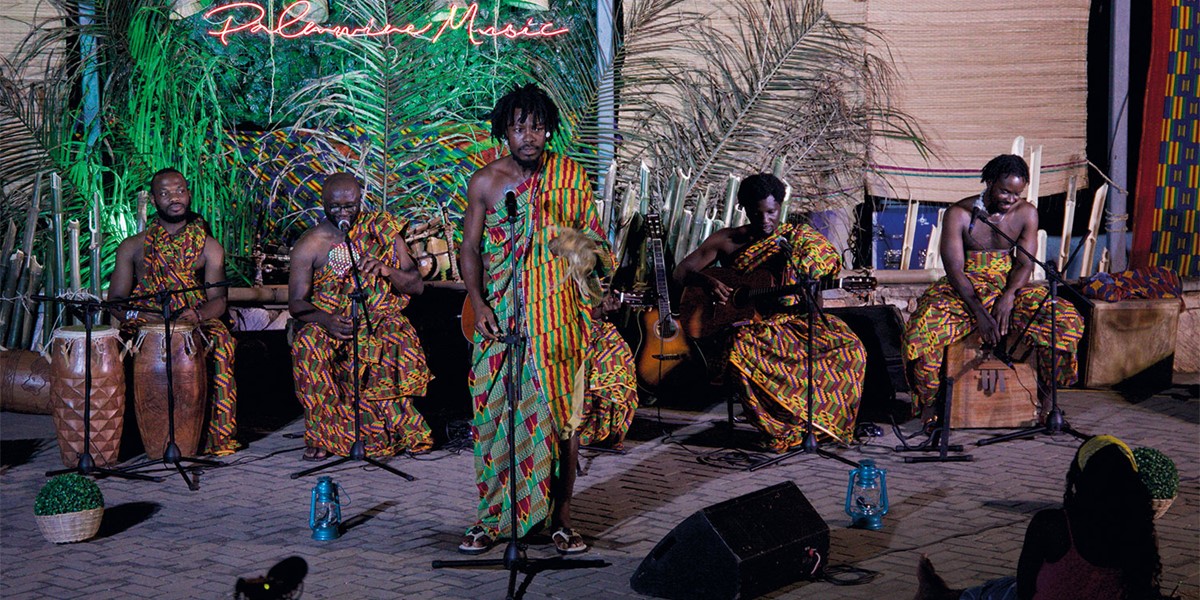Thursday, December 12, 2024
Field of Research: Ghanaian Palmwine Music
Josh Brew seeks a revival of one of Ghana’s most iconic genres, to raise awareness of the country’s environmental issues

Kwame Brenya and Legon Palmwine Band at Nsadwase Festival 2023 (Gifts from Nature edition)
My ongoing project on music and ecological sustainability in Ghana seeks to examine and implement innovative approaches to revitalise Ghanaian palmwine music, with the ultimate goal of contributing to environmental sustainability in Ghana. Within it, I take the gift concept seriously. Drawing from the African knowledge system – specifically that of the Akans, Ghana’s largest ethnic group – I explore their view of natural resources and music as gifts. With reciprocity at its core, this approach motivates us to harness music’s potential in raising environmental awareness and promoting sustainable practices. The concept can bridge Indigenous ecological knowledge with modern scientific conservation efforts, underscoring the importance of diverse knowledge forms in addressing today’s sustainability challenges.
Ghana currently faces severe environmental issues, including deforestation, land degradation and poor waste management, but the most omnipresent is the illegal mining for gold, colloquially known as galamsey (Pidgin English for ‘gather and sell them’). Galamsey is destroying water bodies and land. Driven by poverty and unemployment, the practice has grown, attracting people from various countries seeking quick money. It is devastating for both humans and non-humans, leading to death, skin diseases, congenital disabilities, respiratory issues and cancer. Galamsey is considered a national emergency, with citizens engaged in several protests against the practice.
While this goes on, there are efforts by musicians to help sustain palmwine music, one of the country’s crucial music traditions, albeit one which is moribund. Intimate singing, simple lyrics and chordal progressions characterise palmwine music. The instrumentation consists primarily of an acoustic nylon-stringed guitar, Indigenous drums and rattles. The music’s hypnotic melodies and lyrics are deeply rooted in Akan epistemologies that highlight Ghanaian social and moral values. Palmwine music originated from the Akan traditional gathering called Nsadwase, where community elders gathered under a tree, drank palm wine (an alcoholic beverage made from the sap of palm trees) and discussed societal issues. Over the years, it became a distinctive Akan music tradition that, despite its recent decline, remains the foundation of Ghanaian popular music like highlife and hiplife, and its sound is a significant influence in the now globally acclaimed Afrobeats.
Palmwine music is intertwined in deep and meaningful ways with the natural environment. First, palm wine is shared and used for libation and refreshment during performances, hence the music’s moniker. Second, the instruments are made from natural materials, and performances occur preferably in open natural spaces. Third, palmwine music’s storytelling mode, infused with Akan philosophies and values, compels the audience to be attentive and contemplative.
Since 2016, there has been a growing movement to breathe new life into the tradition. Local ensembles such as the Legon Palmwine Band, Nkyimkyim Band, Akom Band and Kwan Pa have been employing multifaceted approaches that encompass meticulous documentation, captivating performances and dedicated youth training programmes. I’ve joined forces with these musicians and others to incorporate environmental awareness into the palmwine music tradition sustainability project. If we consider our musical abilities and talents as gifts, then using them to address pressing ecological issues becomes a fitting and necessary gesture of reciprocity. With this philosophy in mind, I’m collaborating with these musicians to create an ecologically focused palmwine music album. This project is rooted in the Akan knowledge system and will feature lyrics in both Akan and English, aiming to promote environmental consciousness while simultaneously contributing to the revival and preservation of the palmwine music tradition. This builds on and expands the functions that have long been integral to Ghanaian music: music as entertainment and as an educational tool capable of transforming various aspects of society.
As a step towards this, I am thrilled to announce the release of a single from our upcoming album. The track, ‘Galamsey’, is a collaboration featuring the talents of Wanlov the Kubolor, a musician celebrated for his innovative and creative genius in Ghanaian music. Wanlov infuses the project with his signature blend of traditional and modern elements that resonate with audiences across generations. By weaving together captivating melodies, thought-provoking lyrics, and the unmistakable guitar rhythms of palmwine music, we hope to engage listeners on both an emotional and intellectual level, inspiring them to reflect on their relationship with the environment and their role in preserving it for future generations.
Josh Opoku Brew is a PhD candidate in Music and Africana Studies at the University of Pittsburgh. He is currently a predoctoral fellow at the Woodson Institute for African American and African Studies at the University of Virginia

